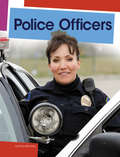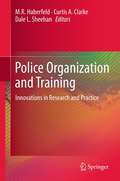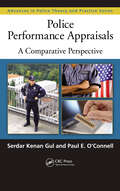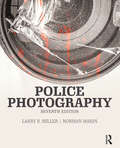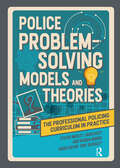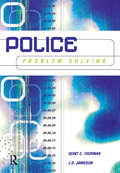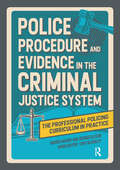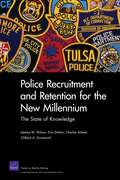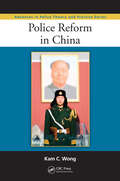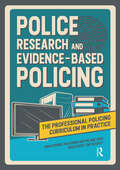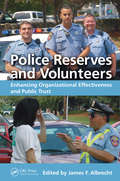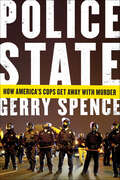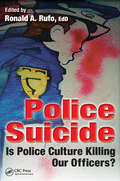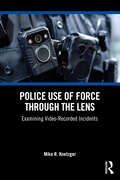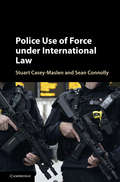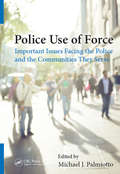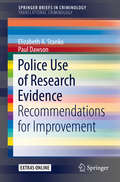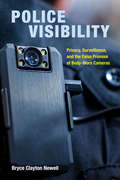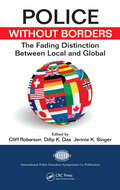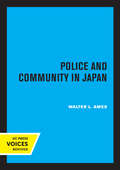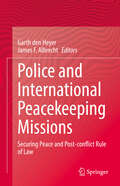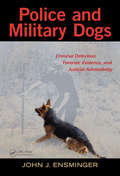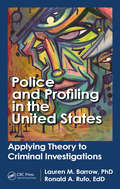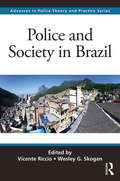- Table View
- List View
Police Officers (Jobs People Do)
by Mary MeinkingPolice officers help people in need and make sure everyone follows the law. With more and more news stories, the public eye is fixed on the police. Readers will learn what its really like to be an officer, the tools they use, and how people become part of the police force.
Police Officers (People in My Community)
by Jacqueline Laks GormanExplains what police officers do, including helping people in trouble, stopping people who break the law, and directing traffic.
Police Organization and Training
by M. R. Haberfeld Dale L. Sheehan Curtis A. ClarkeCriminal enterprises are growing in sophistication. Terrorism is an ongoing security threat. The general public is more knowledgeable about legal matters. These developments, among others, necessitate new methods in police work--and in training new recruits and in-service officers. Given these challenges, improvements in training are a vital means of both staying ahead of lawbreakers and delivering the most effective services to the community. Police Organization and Training surveys innovations in law enforcement training in its evolution from military-style models toward continuing professional development, improved investigation methods, and overall best practices. International dispatches by training practitioners, academics, and other experts from the US, the UK, Canada, Germany, Hong Kong, and elsewhere emphasize blended education methods, competency-building curricula, program and policy development, and leadership concepts. These emerging paradigms and technologies, coupled with a clear focus on ethical issues, provide a lucid picture of the future of police training in both educational and law enforcement contexts. In addition, the book's training templates are not only instructive but also adaptable to different locales. Featured in the coverage: Simulation technology as a training tool, the Investigation Skill Education Program and the Professionalizing Investigation Program, redesigning specialized advanced criminal investigation and training, a situation-oriented approach to addressing potentially dangerous situations, developments in United Nations peacekeeping training and combating modern piracy Police Organization and Training is a key resource for researcher sand policymakers in comparative criminal justice, police and public administration, and police training academies. It also has considerable utility as a classroom text in courses on policing and police administration. Includes a forward by Ronald K Noble, Secretary General of INTERPOL.
Police Performance Appraisals: A Comparative Perspective (Advances in Police Theory and Practice)
by Paul O'Connell Serdar Kenan GulPolice performance appraisal is one of the most important components of law enforcement management affecting the quality of the services a department delivers as well as the satisfaction of its employees. Therefore, it is crucial that the performance appraisal process is conducted in an effective and equitable manner. Police Performance Appraisals:
Police Photography
by Larry S. Miller Norman MarinQuality photographs of evidence can communicate details about crime scenes that otherwise may go unnoticed, making skilled forensic photographers invaluable assets to modern police departments. For those seeking a current and concise guide to the skills necessary in forensic photography, Police Photography , Seventh Edition, provides both introductory and more advanced information about the techniques of police documentation. Completely updated to include information about the latest equipment and techniques recommended for high-quality digital forensic photography, this new edition thoroughly describes the techniques necessary for documenting a range of crime scenes and types of evidence, including homicides, arson, and vehicle incidents. With additional coverage of topics beyond crime scenes, such as surveillance and identification photography, Police Photography , Seventh Edition is an important resource for students and professionals alike.
Police Problem Solving Models and Theories (The Professional Policing Curriculum in Practice)
by Steve Wadley Laura Riley Sharda MurriaAddresses the policing models and concepts which underpin officers' daily decision making. It clearly relates theory to practice and promotes transferrable skills including critical thinking and case study analysis.This book offers the reader a comprehensive understanding of problem-solving models and policing theory. The approach bridges the gap between academic understanding and practical considerations, and situates police decision making within ethical frameworks adopted by police services in England and Wales. It also draws attention to the legislation which underpins the context of problem solving and the policies which inform this. Models are discussed in relation to theoretical underpinnings and implementation is examined through policy and legislation, historical success and limitations.Critical thinking is a must for all police officers present and future and, as such, readers are challenged to consider decision making and the impact of their choices for both themselves as police officers and the wider community that they will go on to serve. Chapters cover neighbourhood, 'hot spot' and predictive policing, rational choice theory, situational crime prevention and partnership working. Readers can benefit from reading the text cover to cover to gain a developing understanding of the topic, or they can use it to reference key principles and ideas.This text is part of the Professional Policing Curriculum in Practice series.
Police Problem Solving: Controversies, Challenges, And Solutions - An Anthology (Controversies In Crime And Justice Ser.)
by J. D. Jamieson Quint ThurmanOffering a balanced approach to problem-solving issues in a complex and changing world, this book focuses specifically on the subject of problem solving in policing. Featured selections include chapters on domestic security, disorderly youth, auto theft, prostitution, gang delinquency and crime in public housing. Other notable selections discuss the role of supervising police personnel engaged in problem solving, advances in using this approach in criminal investigations, solving serial crimes, preparing for terrorism, and developing patrol officers as effective first responders to active violence.
Police Procedure and Evidence in the Criminal Justice System (The Professional Policing Curriculum in Practice)
by Barrie Archer George EllisonPolice procedure and evidence brought to life!A key text for all those on policing degree or other pre-join routes, this book examines police procedure and evidence in the criminal justice system, providing clear and accessible information while encouraging analysis and reflection. Chapters cover police powers, stop and search, arrest and custody, disposals, court procedures and disclosure, and rehabilitation. Uniquely it follows the journey of a fictional family who all in one way or another become involved in the criminal justice system, allowing students to consider a range of possible options and outcomes and bringing the theory to life.
Police Recruitment and Retention for the New Millennium
by Clifford A. Grammich Charles Scheer Erin Dalton Jeremy M. WilsonMany police departments report difficulties in creating a workforce that represents community demographics, is committed to providing its employees the opportunity for long-term police careers, and effectively implements community policing. This book summarizes lessons on recruiting and retaining effective workforces.
Police Reform in China (Advances in Police Theory and Practice)
by Kam C. WongSweeping changes have altered the cultural landscape of China. This volume provides an insightful glimpse of policing in the midst of such change. Beginning with a historical account of police reform in the region since 2000, it discusses the difficulties encountered in trying to understand Chinese policing. Demonstrating how old ideologies are increasingly in conflict with the values and lifestyles of a new mentality, the book discusses steps that can be taken to improve professionalism. The final chapters highlight the importance of understanding the Chinese people, culture, values, and interests in order to truly effectuate successful police reform.
Police Research and Evidence-based Policing (The Professional Policing Curriculum in Practice)
by Craig Hughes Emma Spooner Phil Mike JonesEvidence-based policing is a core part of the National Policing Curriculum but policing students and new officers often feel daunted by the prospect of understanding research and how to use it to inform decision making in practice. This text helps readers develop a sound understanding of evidence-based practice in policing and contextualises the research process by explaining how it supports practice within the workplace. It clearly relates research to the investigative process, combining academic theory and operational understanding using relevant case studies and scenarios, and identifies the main approaches employed. It explores how evidence from research can be used to inform and develop critical arguments central to policing practice and signposts students to key sources of information.The Professional Policing Curriculum in Practice is a new series of books that match the requirements of the new pre-join policing qualifications. The texts reflect modern policing, are up-to-date and relevant, and grounded in practice. They reflect the challenges faced by new students, linking theory to real-life operational practice, while addressing critical thinking and other academic skills needed for degree-level study.
Police Reserves and Volunteers: Enhancing Organizational Effectiveness and Public Trust
by James F. AlbrechtReductions in police department funding have raised the importance of volunteers in enhancing organizational performance, improving community trust and confidence, and at times accomplishing basic tasks to maintain public safety and security. During a period when police administrators are asked to do more with less, and to engage in smarter, community-oriented policing, citizen volunteers are an invaluable resource. Police Reserves and Volunteers is an invaluable primer for those looking to understand the benefits and challenges involved in the use of the volunteers within global law enforcement agencies. Using cases from a range of specialists and precincts, this edited volume provides a rare window into police administration from the state legislation that regulates police reserves in California to the local models observed in many counties and cities across the United States. Police Reserves and Volunteers offers volunteers, local elected officials, and law enforcement straightforward guidelines to enhance police goals and build public trust in local communities.
Police State: How America's Cops Get Away with Murder
by Gerry SpenceHow does America, founded on the promise of freedom for all, find itself poised to become a police state?In Police State, legendary "country lawyer" Gerry Spence reveals the unnerving truth of our criminal justice system. In his more than sixty years in the courtroom, Spence has never represented a person charged with a crime in which the police hadn't themselves violated the law. Whether by hiding, tampering with, or manufacturing evidence; by gratuitous violence and even murder, those who are charged with upholding the law too often break it. Spence points to the explosion of brutality leading up to the murder of Freddie Gray in Baltimore, insisting that this is the way it has always been: cops get away with murder. Nothing changes. Police State narrates the shocking account of the Madrid train bombings -how the FBI accused an innocent man of treasonous acts they knew he hadn't committed. It details the rampant racism within Chicago's police department, which landed teenager Dennis Williams on death row. It unveils the deliberately coercive efforts of two cops to extract a false murder confession from frightened and mentally fragile Albert Hancock, along with other appalling evidence from eight of Spence's most famous cases.We all want to feel safe. But how can we be safe when the very police we pay to protect us instead kill us, maim us, and falsify evidence against us. Can we accept the argument that cops may occasionally overstep their boundaries, but only when handling guilty criminals and never with us? Can we expect them to investigate and prosecute themselves when faced with allegations of misconduct? Can we believe that they are acting for our own good? Too many innocent are convicted; too many are wrongly executed. The cost has become too high for a free people to bear.In Police State, Spence issues a stinging indictment of the American justice system. Demonstrating that the way we select and train our police guarantees fatal abuses of justice, he also prescribes a challenging cure that stands to restore America's promise of liberty and justice for all.
Police Suicide: Is Police Culture Killing Our Officers?
by Ronald A. RufoThere is no question that more police officers die from suicide than those killed in the line of duty. The suicide and attempted suicide of police officers is a mental health concern that has been neglected for far too long.Police Suicide: Is Police Culture Killing Our Officers? provides realistic insight into the life of a police officer through a
Police Use of Force Through the Lens: Examining Video-Recorded Incidents
by Mike R. KnetzgerPolice Use of Force Through the Lens provides a comprehensive look at video-recorded use-of-force incidents and how video influences perceptions about the appropriateness of the force used. No other book on the market takes a historical, critical, and contemporary look at how video footage from dash cameras, body-worn cameras, surveillance cameras, or handheld cameras influence how people perceive the appropriateness of force used by law enforcement officers, correctional officers, and security officers.Supported with academic sources along with practical examples that connect academics to the real world, the book educates readers about the history of cameras in law enforcement, significant events that influenced the proliferation of cameras in law enforcement, how use-of-force incidents are evaluated, how camera factors influence perceptions, and how human factors can impact how officers perceive and recall what occurred during use-of-force incidents.A thorough discussion of the benefits and disadvantages of cameras—including how camera perspectives can be misleading and incomplete—challenges the presumption of the objectiveness of video and posits a systematic framework to help evaluators or viewers of video-recorded use-of-force incidents arrive at more objective conclusions.
Police Use of Force under International Law
by Sean Connolly Stuart Casey-MaslenPolicing is commonly thought to be governed by domestic legal systems and not international law. However, various international legal standards are shown to have an impact in situations where police use force. Police Use of Force under International Law explores this tension in detail for the first time. It critically reviews the use of force by law enforcement agencies in a range of scenarios: against detainees, during protests, and in the context of counterterrorism and counterpiracy operations. Key trends, such as the growing use of private security services, are also considered. This book provides a human rights framework for police weaponry and protection of at-risk groups based on critical jurisprudence from the last twenty years. With pertinent case law and case studies to illustrate the key principles of the use of force, this book is essential reading for anyone interested in policing, human rights, state use of force or criminology.
Police Use of Force: Important Issues Facing the Police and the Communities They Serve
by Michael J. PalmiottoStarting with a historical introduction, Police Use of Force presents readers with critical and timely issues facing police and the communities they serve when police encounters turn violent. Dr. Palmiotto offers in-depth coverage of the use of force, deadly force, non-lethal weapons, militarization of policing, racism and profiling, legal cases, psychology, perception and training, and violence prevention. Police Use of Force also investigates many case studies, both famous (Rodney King) and contemporary (Ferguson, MO). Essential reading for both criminal justice professionals and academics, this text places police conflict within a complex, modern context, inviting cogent conversation in the classroom and the precinct.
Police Use of Research Evidence
by Elizabeth A. Stanko Paul DawsonThis brief takes the reader through a 10-year journey of seeking to embed Evidence Based Policing within one of the largest police forces in the world - the Metropolitan Police Service in London, England - from the inside. As a topic, Evidence Based Policing has generated considerable recent interest and academic discussion - although largely remains without a consistent guiding voice for police practitioners. The aim of the brief is to expand upon the current discussions and address this gap within the day-to-day reality of policing where translation of research is a routine part of the day job. The book is organised into three sections: the first explores receptivity to evidence, asking practitioners to locate where they are on a continuum of evidence based craftwork; the second presents the importance of programme integrity and effective implementation in police craft; and the final section explores the challenges in professionalising policing and offers a more nuanced discussion around what it really means to be evidenced based. Throughout the brief the authors promote an insider whole-force strategic approach in landing evidence into policing 'business as normal' as opposed to an external academic or educated individual officer translation approach. Over the course of the monograph the authors draw upon their decade of experience providing case studies, toolkits, exercises, anecdotes and research experience as an inspiration for police practitioners both to practically support and inspire better evidence based working as part of the day job.
Police Visibility: Privacy, Surveillance, and the False Promise of Body-Worn Cameras
by Bryce Clayton NewellPolice Visibility presents empirically grounded research into how police officers experience and manage the information politics of surveillance and visibility generated by the introduction of body cameras into their daily routines and the increasingly common experience of being recorded by civilian bystanders. Newell elucidates how these activities intersect with privacy, free speech, and access to information law and argues that rather than being emancipatory systems of police oversight, body-worn cameras are an evolution in police image work and state surveillance expansion. Throughout the book, he catalogs how surveillance generates information, the control of which creates and facilitates power and potentially fuels state domination. The antidote, he argues, is robust information law and policy that puts the power to monitor and regulate the police squarely in the hands of citizens.
Police Without Borders: The Fading Distinction between Local and Global (International Police Executive Symposium Co-Publications)
by Cliff Roberson Dilip K. Das Jennie K. SingerThe Fifteenth Annual International Police Executive Symposium brought together 65 police executives, government officials, academics, and researchers to discuss issues relating to all aspects of policing in a global community. It focused on policing without borders, the need for national and international cooperation among policing agencies, and th
Police and Community in Japan
by Walter Lansing AmesThis title is part of UC Press's Voices Revived program, which commemorates University of California Press’s mission to seek out and cultivate the brightest minds and give them voice, reach, and impact. Drawing on a backlist dating to 1893, Voices Revived makes high-quality, peer-reviewed scholarship accessible once again using print-on-demand technology. This title was originally published in 1981.
Police and International Peacekeeping Missions: Securing Peace and Post-conflict Rule of Law
by James F. Albrecht Garth Den HeyerThis edited volume examines the experiences and the roles of the police deployed on peacekeeping and intervention missions in Afghanistan, Bougainville, Cyprus, Haiti, Kosovo, Namibia, Solomon Islands, Timor Leste, and Ukraine. Despite the extensive literature that has examined the role of the military in peacekeeping and intervention operations, little literature or information that investigates the role and the work of the police or the methods that they use to assist in the reformation of local police is available. This book provides an overview of the history and role of the police in peacekeeping missions, and discusses the principle factors of police reform and development in post-conflict nations. It includes case studies assessing the background of the conflict and the police deployments, as well as their role, contributions, and achievements. Including two in-depth surveys of police officer experiences on peacekeeping missions, this volume will be of great value to policing researchers and law enforcement leadership, police historians, and students and researchers of post-conflict development.
Police and Military Dogs: Criminal Detection, Forensic Evidence, and Judicial Admissibility
by John EnsmingerIt is essential that those in the criminal justice system understand the tasks that police dogs perform and the evidence that their work produces. Police and Military Dogs: Criminal Detection, Forensic Evidence, and Judicial Admissibility examines the use of police and military dogs for a wide variety of functions and explores canine biology and be
Police and Profiling in the United States: Applying Theory to Criminal Investigations
by Lauren M. Barrow Ron A. Rufo Saul ArambulaTraditionally, criminal profiling texts have focused on the technicalities of conducting an investigation, but recent developments in criminal justice have encouraged greater consideration of related fields. Highlighting the current paradigm shift in criminology towards a cross-disciplinary understanding of behavior, this book enables investigators to combine theory, instinct, and hunches with contemporary technology to construct a solid criminal profile. It examines theories on criminal behavior, describes how to develop typologies based on different criminal characteristics, examines the critical role of crime scenes, and concludes with scintillating profiles of 13 of the most notorious serial killers.
Police and Society in Brazil (Advances in Police Theory and Practice)
by Vicente Riccio Wesley G. SkoganIn Brazil, where crime is closely associated with social inequality and failure of the criminal justice system, the police are considered by most to be corrupt, inefficient, and violent, especially when occupying poor areas, and they lack the widespread legitimacy enjoyed by police forces in many nations in the northern hemisphere. This text covers hot-button issues like urban pacification squads, gangs, and drugs, as well as practical topics such as policy, dual civil and military models, and gender relations. The latest volume in the renowned Advances in Police Theory and Practice Series, Police and Society in Brazil fills a gap in English literature about policing in a nation that currently ranks sixth in number of homicides. It is a must-read for criminal justice practitioners, as well as students of international policing.
